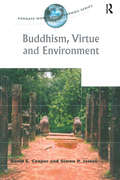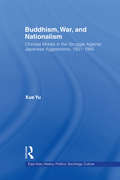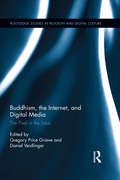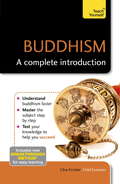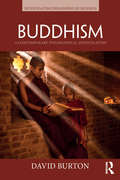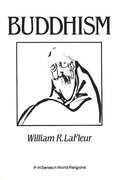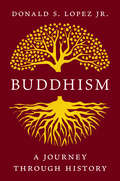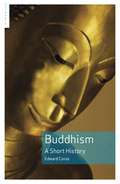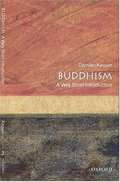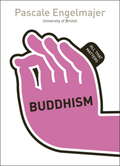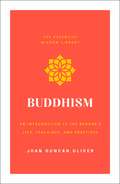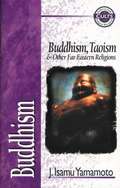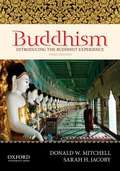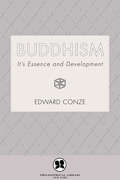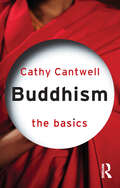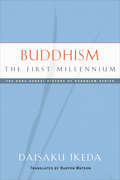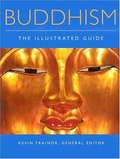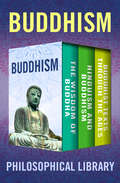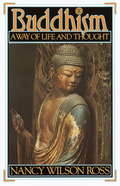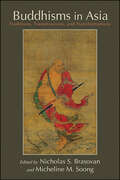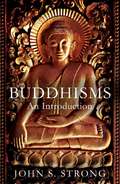- Table View
- List View
Buddhism, Virtue and Environment (Ashgate World Philosophies Series)
by David E. Cooper Simon P. JamesBuddhism, one increasingly hears, is an 'eco-friendly' religion. It is often said that this is because it promotes an 'ecological' view of things, one stressing the essential unity of human beings and the natural world. Buddhism, Virtue and Environment presents a different view. While agreeing that Buddhism is, in many important respects, in tune with environmental concerns, Cooper and James argue that what makes it 'green' is its view of human life. The true connection between the religion and environmental thought is to be found in Buddhist accounts of the virtues - those traits, such as compassion, equanimity and humility, that characterise the life of a spiritually enlightened individual. Central chapters of this book examine these virtues and their implications for environmental attitudes and practice. Buddhism, Virtue and Environment will be of interest not only to students and teachers of Buddhism and environmental ethics, but to those more generally engaged with moral philosophy. Written in a clear and accessible style, this book presents an original conception of Buddhist environmental thought. The authors also contribute to the wider debate on the place of ethics in Buddhist teachings and practices, and to debates within 'virtue ethics' on the relations between human well-being and environmental concern.
Buddhism, War, and Nationalism: Chinese Monks in the Struggle Against Japanese Aggression 1931-1945 (East Asia: History, Politics, Sociology and Culture)
by Xue YuThis thesis examines the doctrinal grounds and different approaches to working out this "new Buddhist tradition," a startling contrast to the teachings of non-violence and compassion which have made Buddhism known as a religion of peace. In scores of articles as war approached in 1936-37, new monks searched and reinterpreted scripture, making controversial arguments for ideas like "compassionate killing" which would justify participating in war.
Buddhism, the Internet, and Digital Media: The Pixel in the Lotus (Routledge Studies in Religion and Digital Culture)
by Gregory Price Grieve Daniel VeidlingerBuddhism, the Internet and Digital Media: The Pixel in the Lotus explores Buddhist practice and teachings in an increasingly networked and digital era. Contributors consider the ways Buddhism plays a role and is present in digital media through a variety of methods including concrete case studies, ethnographic research, and content analysis, as well as interviews with practitioners and cyber-communities. In addition to considering Buddhism in the context of technologies such as virtual worlds, social media, and mobile devices, authors ask how the Internet affects identity, authority and community, and what effect this might have on the development, proliferation, and perception of Buddhism in an online environment. Together, these essays make the case that studying contemporary online Buddhist practice can provide valuable insights into the shifting role religion plays in our constantly changing, mediated, hurried, and uncertain culture.
Buddhism: A Complete Introduction
by Clive ErrickerBuddhism: A Complete Introduction is a comprehensive and easy-to-use introduction, designed to give you everything you need to succeed, all in one place.Written by a leading expert, this book will help you if you are studying for an important exam or essay, or if you simply want to improve your knowledge. It is structured to mirror the way in which Buddhism is usually taught, starting with the life of the Buddha through to the prospects of Buddhism for the next generation. The book covers all the key areas that are considered central to Buddhism, including the Buddha's teachings, the scriptures and schools, the role of meditation and the moral and ethical context. It uses jargon-free English and includes features such as guided further reading and end of chapter questions to ensure that you understand all the concepts covered.
Buddhism: A Complete Introduction: Teach Yourself
by Clive ErrickerBuddhism: A Complete Introduction is a comprehensive and easy-to-use introduction, designed to give you everything you need to succeed, all in one place. Written by a leading expert, this book will help you if you are studying for an important exam or essay, or if you simply want to improve your knowledge. It is structured to mirror the way in which Buddhism is usually taught, starting with the life of the Buddha through to the prospects of Buddhism for the next generation.The book covers all the key areas that are considered central to Buddhism, including the Buddha's teachings, the scriptures and schools, the role of meditation and the moral and ethical context. It uses jargon-free English and includes features such as guided further reading and end of chapter questions to ensure that you understand all the concepts covered.Buddhism: A Complete Introduction includes: Chapter 1: Buddhists and BuddhismChapter 2: The life of the BuddhaChapter 3: The Buddha's teachingChapter 4: Buddhist scriptures and schoolsChapter 5: Meditation and devotionChapter 6: Ethical conductChapter 7: Moral IssuesChapter 8: The social orderChapter 9: Festivals and ceremoniesChapter 10: Budhist today: East and WestChapter 11: Transition, adaptation and influence: prospects for Buddhism in the twenty-first centuryLearn effortlessly with a new easy-to-read page design and added features:Not got much time?One, five and ten-minute introductions to key principles to get you started.Author insightsLots of instant help with common problems and quick tips for success, based on the author's many years of experience.Test yourselfTests in the book and online to keep track of your progress.Extend your knowledgeExtra online articles to give you a richer understanding of psychology.Five things to rememberQuick refreshers to help you remember the key facts.Try thisInnovative exercises illustrate what you've learnt and how to use it.
Buddhism: A Contemporary Philosophical Investigation (Investigating Philosophy of Religion)
by David BurtonBuddhism, in its diverse forms and throughout its long history, has had a profound influence on Asian cultures and the lives of countless individuals. In recent times, it has also attracted great interest among people in other parts of the world, including philosophers. Buddhist traditions often deal with ideas and concerns that are central to philosophy. A distinctively Buddhist philosophy of religion can be developed which focuses on Buddhist responses to issues such as the problem of suffering, the purpose and potential of human existence, life after death, freedom and moral responsibility, appearance and reality, the nature of religious language, attitudes to religious diversity and the relationship between Buddhism and science. Buddhism: A Contemporary Philosophical Investigation examines some of the central questions that such ideas raise, drawing on ancient and more recent sources from a variety of Buddhist traditions, as viewed from a contemporary philosophical standpoint.
Buddhism: A Cultural Perspective
by William R. La FleurThis book begins with Buddhism's involvement in the culture and thought of India, and observes its moves into other, very different contexts: China, Southeast Asia, Tibet, Japan, and even the West, to a limited extent. The book accepts the diversity within Buddhism, giving roughly equal treatment to its two major traditions -- the Theravada and the Mahayana. Probes the philosophy and religion of Buddhism and how they relate to cultural traditions.
Buddhism: A Journey through History
by Donald S. LopezOne of the world’s leading scholars of Buddhism presents the story of its dramatic journey across the globe, from 2,500 years ago to the present day Over the course of twenty-five centuries, Buddhism spread from its place of origin in northern India to become a global tradition of remarkable breadth, depth, and richness. In this ambitious book, Donald S. Lopez Jr. draws on the latest scholarship to construct a detailed and innovative history of Buddhism—not just as a chronology through the centuries or as geographic movement across a map, but as a dense matrix of interconnections. Beginning with the life and teachings of the Buddha, Lopez shows how a set of evolving ideas and practices traveled north and east to China, Korea, Japan, Mongolia, and Tibet, south and southeast to Sri Lanka, Burma, Thailand, Cambodia, Laos, Vietnam, and Indonesia, and finally westward to Europe and the Americas. He provides insights on questions that Buddhism has asked and answered in different times and different places—about apocalypse, art, identity, immortality, law, nation, persecution, philosophy, science, sex, war, and writing. Vast in its erudition and expansive in its vision, this is the most complete single‑volume history of Buddhism in its full historical and geographical range.
Buddhism: A Short History (From Buddhism To Sufism Ser.)
by Edward ConzeIn this authoritative guide, one of the world's most distinguished scholars of Buddhism provides a compact summary of the tradition's development, from the time of the Buddha to the 20th century exile of the Dalai Lama. Covering all the Buddhist schools from Maháyána to Zen, this comprehensive, concise study is widely acknowledged as the classic introduction to the history of the Buddhist tradition, perfect for students and interested readers alike. Edward Conze studied Indian and comparative philosophy at the universities of Bonn and Hamburg.
Buddhism: A Very Short Introduction
by Damien KeownThis Very Short Introduction introduces the reader to the teachings of the Buddha and to the integration of Buddhism into daily life. What are the distinctive features of Buddhism? Who was the Buddha, and what are his teachings? How has Buddhist thought developed over the centuries, and how can contemporary dilemmas be faced from a Buddhist perspective? Words such as 'karma' and 'nirvana' have entered our vocabulary, but what do they mean? Damien Keown's book provides a lively, informative response to these frequently asked questions about Buddhism.
Buddhism: A Very Short Introduction (Very Short Introductions Series)
by Damien KeownThis accessible volume covers both the teachings of the Buddha and the integration of Buddhism into daily life. What are the distinctive features of Buddhism? What or who is the Buddha, and what are his teachings? How has Buddhist thought developed over the centuries, and how can contemporary dilemmas be faced from a Buddhist perspective? Words such as "karma" and "nirvana" have entered our vocabulary, but what do they really mean? <p><p>Keown has taught Buddhism at an introductory level for many years, and in this book he provides a lively, challenging response to these frequently asked questions.
Buddhism: All That Matters (All That Matters Ser.)
by Pascale EngelmajerMost introductions to Buddhism look at the life of the Buddha, and the practice of Buddhism in the West today. But this is rather like publishing a book on Christianity, and only mentioning Jesus and the Church of England. In this wide-ranging new study, Bristol University's Pascale Engelmajer seeks to relocate Buddhism in its historical and global context. This important new thinking is grounded in the stories of four people who are practising Buddhism around the world in very different ways. By celebrating the diversity of Buddhism, Dr Engelmajer tells a story that is often lost beneath Western talk (and confusion) about Feng Shui, yoga, and the Dalai Lama.
Buddhism: All That Matters (All That Matters)
by Pascale EngelmajerIn Buddhism: All That Matters, Dr Engelmajer gives us a glimpse of what being a Buddhist in today's world entails, and how this links back to the historical and doctrinal development of the many Buddhist traditions extant today.The narrative follows the religious lives of four fictional characters, representative of four Buddhist traditions (Theravada, Chinese Pure Land, Japanese Zen and Tibetan) in their daily lives, describing what being a Buddhist today entails: religious and devotional practices, dietary requirements, ethical principles, and religious and philosophical beliefs. Grounded in the latest scholarship, this book offers a live picture of Buddhism as it is: a variety of practices and beliefs that stem from common doctrines and have developed in many ways across time and space.This accessible and concise book will appeal to both students and general readers, giving a fascinating introduction book will appeal to both students and general readers, giving a fascinating introduction.
Buddhism: An Introduction to the Buddha's Life, Teachings, and Practices (The Essential Wisdom Library) (The Essential Wisdom Library)
by Joan Duncan OliverA modern guide to the teachings of Buddhism Buddhism: An Introduction to the Buddha’s Life, Teachings, and Practices is an indispensable guide to a 2,600-year-old wisdom tradition that has transformed the lives of millions across centuries and around the world. Readers will learn how Siddhartha Gautama became the Buddha, one of the most influential spiritual leaders of all time, and discover how they too can follow his revolutionary methods to attain happiness and inner freedom. Along with accessible overviews of central teachings—the Four Noble Truths, the Eightfold Path, karma, core virtues like kindness and compassion, and more—Buddhism covers such basics as:- the three main Buddhist traditions—Theravada, Mahayana, and Vajrayana—historically and their relevance today- the role of meditation and mindfulness in Buddhist practice- step-by-step instruction in key Buddhist practices Writing in an engaging, approachable style, author Joan Duncan Oliver outlines the fundamentals of Buddhism for every reader, revealing its timeless truths and their relevance for finding peace in uncertain times. A practitioner of Buddhist meditation for forty years, Oliver has written extensively on Buddhist wisdom and its application to daily life. Her practical approach makes Buddhism an essential modern guidebook to an ancient tradition.
Buddhism: Buddhism, Taoism and Other Far Eastern Religions
by Alan W. Gomes J. Isamu YamamotoIn the second half of the twentieth century, the failure of Enlightenment rationalism and the spiritual bankruptcy of Western materialism have opened the door for Eastern religions, especially the nontheistic religions that promise enlightenment and peace of mind. Any major bookstore today has copies of the I Ching, the Tao Te Ching, and books on Taoism, Zen, and other forms of Buddhism. This volume and the volume on Hinduism in this series together present a comprehensive overview of Eastern religions, their views, and their impact on contemporary North America. This book includes - A concise introduction to Eastern religions - An overview of the movement's theology -- in their own words - A biblical response - Tips for witnessing effectively - A bibliography with sources for further study - A chart comparing the groups' beliefs with biblical Christianity - A glossary
Buddhism: Bullet Guides
by Paul OliverOpen this book and you will Discover Buddha's teachings Gain awareness Apply Buddhist beliefs Become enlightened
Buddhism: Introducing The Buddhist Experience
by Donald Mitchell Sarah JacobyBuddhism: Introducing the Buddhist Experience, Second Edition, focuses on the depth of Buddhist experience as expressed in the teachings and practices of its religious and philosophical traditions. Taking a broad and inclusive approach, this unique work spans over 2,500 years, offering chapters on Buddhism's origins in India; Theravada and Mahayana Buddhism; and Buddhism in Southeast Asia, Tibet, China, Korea, and Japan. It also includes an extensive discussion of modern, socially engaged Buddhism and a concluding chapter on the spread of Buddhism to the West. Author Donald W. Mitchell provides substantial selections of primary text material throughout that illustrate a great variety of moral, cultural, psychological, meditative, and spiritual Buddhist experiences.
Buddhism: Its Essence and Development
by Edward ConzeWith a great clarity and from a scientific point of view, the author presents a readable survey of the whole range of Buddhist thought. Illustrated
Buddhism: The Basics (The Basics)
by Cathy CantwellBuddhism: The Basics provides a thorough and accessible introduction to a fascinating religion. Examining the historical development of Buddhism and its presence today, this guide covers: principal traditions practices and beliefs ethical guidelines and philosophy religious texts community With helpful features including a detailed map of the Buddhist world, glossary of terms and tips for further study, this is an ideal text for students and interested readers wanting to familiarise themselves with the Buddhist faith. Cathy Cantwell is an academic researcher at the Oriental Institute, University of Oxford. She specialises in Tibetan Buddhism, and has worked on eleventh century manuscripts, an eighteenth century scriptural collection, and contemporary Buddhist ritual manuals and practice. She has taught widely in UK Higher Education and is joint author of Early Tibetan Documents on Phur pa from Dunhuang.
Buddhism: The First Millennium (Soka Gakkai History of Buddhism)
by Burton Watson Daisaku IkedaBeginning with the events immediately following the dark days after the death of Shakyamuni and continuing over a period of 1,000 years, this dynamic tome covers a vast and complex series of events and developments in the history of Buddhism. Through a thorough examination of its early development in India, a new light is cast on little-known aspects of Buddhist history and its relevance to the understanding of Buddhism today. Topics include the formation of the Buddhist canon, the cultural exchange between the East and West, and the spirit of the Lotus Sutra.
Buddhism: The Illustrated Guide
by Kevin TrainorBuddhism is a major spiritual and ethical force in the world today--and certainly one of the fastest growing religions in the West. Its compelling insights into human existence offer an ancient and radical alternative to the materialism of the modern age. More and more people are turning to Buddhism to rediscover the human and the spiritual values they find lacking in traditional Western religions. <p><p>Now, in this strikingly illustrated and authoritative volume, general readers have an illuminating introduction of one of the world's great living faiths. Based on the most recent scholarship, Buddhism provides a vibrantly written and marvelously illustrated overview of this ancient and yet still vital religion. Each chapter is written by an acknowledged authority in the field. The book describes the origins and historic development of Buddhism as well as current trends. Perhaps most important, it explores the central, unifying principles of a religious and philosophical system that finds expression in an extraordinary diversity of forms, from the elaborate and esoteric rituals of Tantric Buddhism to the rarefied, minimalist refinement of Zen. A major section is devoted to an analysis of the religion's more important sacred writings. And throughout the book, magnificent illustrations capture the sacred art, architecture, daily practices, and symbols inspired by the Buddha and his teaching. <p><p>Buddhism in the United States has grown dramatically. Buddhism: The Illustrated Guide offers a wealth of reference information that will deepen one's understanding and appreciation of this ancient Eastern faith.
Buddhism: The Wisdom of Buddha, Hinduism and Buddhism, and Buddhist Texts Through the Ages (From Buddhism To Sufism Ser.)
by Edward Conze Ananda K. Coomaraswamy Philosophical LibraryThis curated collection of primary texts and secondary scholarship offers an engaging and comprehensive view of Buddhism and its founder.The Wisdom of Buddha: Drawn from the sacred books of Buddhism, this collection reveals the core insights and beliefs of the world&’s fourth-largest religion. It covers the birth and death of the Buddha, as well as the major tenets of Buddhism, including karma and the middle doctrine. Hinduism and Buddhism: A highly original discussion of the origins and tenets of the great Eastern religions by a Sri Lankan theorist who introduced ancient Indian art to the West. Buddhist Texts Through the Ages: A comprehensive collection of Buddhist texts and scriptures translated from the original Pali, Sanskrit, Chinese, Tibetan, and Japanese. This edition also includes a glossary of English and foreign terms.
Buddhism: Way of Life & Thought
by Nancy Wilson Ross"A clear, exhilarating exposition of the Buddhist way, well understood, well made, fun to read, and simple in the very best sense of the word—just as it should be!" —Peter Matthiessen, National Book Award Winner of In ParadiseA fascinating volume that explains the origins, development and basic principles of the religion followed by nearly one-quarter of the people on earth.
Buddhisms in Asia: Traditions, Transmissions, and Transformations (SUNY series in Asian Studies Development)
by Nicholas S. Brasovan; Micheline M. SoongOver its long history, Buddhism has never been a simple monolithic phenomenon, but rather a complex living tradition—or better, a family of traditions—continually shaped by and shaping a vast array of social, economic, political, literary, and aesthetic contexts across East Asia, South Asia, and Southeast Asia. Written by undergraduate educators, Buddhisms in Asia offers a guide to Buddhism's rich variety of traditions and cultural expressions for educators who would like to include Buddhism in their undergraduate courses. It introduces fundamental yet often underrepresented Buddhist texts, concepts, and material in their historical contexts; presents the major "ecologies" of Buddhist belief, practice, and cultural expression; and provides methodological insights regarding how best to infuse Buddhist content into undergraduate courses in the humanities and social sciences. The text aims to represent "Buddhisms" by approaching the subject from a broad range of disciplinary perspectives, including art history, anthropology, history, literature, philosophy, religious studies, and pedagogy.
Buddhisms: An Introduction (From Buddhism To Sufism Ser. #5017)
by John S. StrongBuddhisms: An Introduction represents a novel way of presenting the whole of the Buddhist tradition in its unity and multiplicity. Clear in its explanations, replete with tables and suggestions for further reading, it should appeal to students, yet also be of interest to scholars for some of its ways of viewing the Buddha, his teachings, and the Buddhist community through the ages.The volume begins with an overview-introduction to the many aspects of Buddhism by surveying the modern-day temples that exist in Lumbini, the Buddha's birthplace. It then recounts not only the story of the Buddha's life, but the ways in which subsequent Buddhist traditions sought to overcome the absence of the Buddha, after his death. Turning to Buddhist Doctrine, it expands the notion of the Middle Way to depict the manner in which Buddhism both avoided or incorporated the extreme teachings extant in India in its time. It then goes on to show how the theme of the Middle Way also helps us understand the transition to later schools of Buddhist thought. Finally, it examines the establishment and nature of Buddhist community life before going on to show its development in the very different environments of Thailand, Japan, and Tibet.Throughout, the author does not hesitate to lace his explanations with personal anecdotes and insights gathered during over forty years of studying Buddhism and travelling and living in Buddhist countries.
